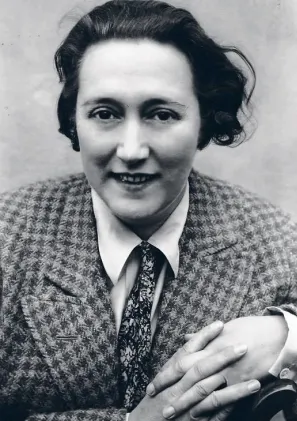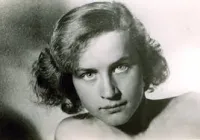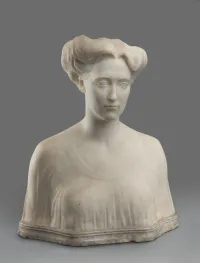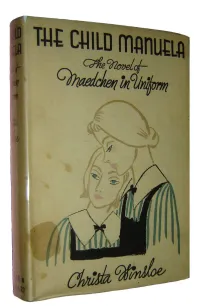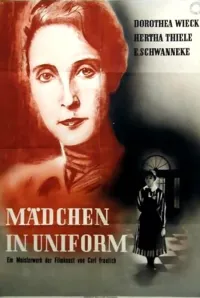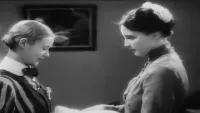Biography
1888 - 1944
Born in Darmstadt, Germany, Christa Winsloe was sent to a strict boarding school in Potsdam. School was followed by her marriage to a wealthy writer, Baron Ludwig Hatvany. During her marriage she wrote the short work ‘The Black Sheep’, followed by the novella Men Return Home in which the heroine dresses in men’s clothing after experiencing a brutal attack. Following the failure of her marriage, Winsloe wrote the play ‘Knight Nerestan’ in 1930, which was produced in Leipzig and then Berlin under the title ‘Yesterday and Today.’ Its success led to a 1931 film version called Mädchen in Uniform’ (Girls in Uniform) with Winsloe as one of the screenwriters. Though the film was a critical and financial success, the lesbian aspect of the story was downplayed. In response, Winsloe wrote ‘Das Mädchen Manuela’ (The Child Manuela), a bolder novelized version of the screenplay in 1933. (An unpublished play ‘Sylvia and Sybille’ dealt even more explicitly with lesbianism.) Early in the 1930s Winsloe became involved with the American journalist Dorothy Thompson. She moved to Berlin where she worked as an animal sculptor while continuing to explore gay themes in her writing. The novel Life Begins (1935), about a young sculptress gaining the courage to live openly with the woman she loves, was followed by the unpublished Half the Violin (1935), a sympathetic novel about a gay man who is compelled to marry due to social pressure. She also wrote ‘Jeunes Filles en Detresse’ (Girls in Distress) for film director G. W. Pabst in 1939. That same year she fled to Cote d’ Azur, France, to a home she shared with her lover, Swiss author Simone Gentet. There the two women offered temporary support and refuge for people fleeing the Nazis. On June 10, 1944 Winsloe and Gentet were shot and killed in a forest near Clunt by four Frenchmen who claimed they thought the women were Nazi spies. Winsloe was 55.
1888 - 1944
Born in Darmstadt, Germany, Christa Winsloe was sent to a strict boarding school in Potsdam. School was followed by her marriage to a wealthy writer, Baron Ludwig Hatvany. During her marriage she wrote the short work ‘The Black Sheep’, followed by the novella Men Return Home in which the heroine dresses in men’s clothing after experiencing a brutal attack. Following the failure of her marriage, Winsloe wrote the play ‘Knight Nerestan’ in 1930, which was produced in Leipzig and then Berlin under the title ‘Yesterday and Today.’ Its success led to a 1931 film version called Mädchen in Uniform’ (Girls in Uniform) with Winsloe as one of the screenwriters. Though the film was a critical and financial success, the lesbian aspect of the story was downplayed. In response, Winsloe wrote ‘Das Mädchen Manuela’ (The Child Manuela), a bolder novelized version of the screenplay in 1933. (An unpublished play ‘Sylvia and Sybille’ dealt even more explicitly with lesbianism.) Early in the 1930s Winsloe became involved with the American journalist Dorothy Thompson. She moved to Berlin where she worked as an animal sculptor while continuing to explore gay themes in her writing. The novel Life Begins (1935), about a young sculptress gaining the courage to live openly with the woman she loves, was followed by the unpublished Half the Violin (1935), a sympathetic novel about a gay man who is compelled to marry due to social pressure. She also wrote ‘Jeunes Filles en Detresse’ (Girls in Distress) for film director G. W. Pabst in 1939. That same year she fled to Cote d’ Azur, France, to a home she shared with her lover, Swiss author Simone Gentet. There the two women offered temporary support and refuge for people fleeing the Nazis. On June 10, 1944 Winsloe and Gentet were shot and killed in a forest near Clunt by four Frenchmen who claimed they thought the women were Nazi spies. Winsloe was 55.
Demography
Demography
Gender Female
Sexual Orientation Lesbian
Gender Identity Cisgender
Ethnicity Caucasian/White
Nations Affiliated France Germany
Era/Epoch World War II (1939-1945)
Field(s) of Contribution
Art
Author
Film
Social Justice
Theater
Demography
Gender Female
Sexual Orientation Lesbian
Gender Identity Cisgender
Ethnicity Caucasian/White
Nations Affiliated France Germany
Era/Epoch World War II (1939-1945)
Field(s) of Contribution
Art
Author
Film
Social Justice
Theater
Resources
Resources
Dyer, Richard. Now You See It: Studies on Lesbian and Gay Film. New York: Routledge, 1990.
Foster, Jeannette H. Sex Variant Women in Literature. Tallahassee, Fla.: Naiad Press, 1985.
Katz, Jonathan. Gay American History. New York: Thomas Y. Crowell, 1976.
Katz, Jonathan. Gay/Lesbian Almanac. New York: Harper and Row, 1983.
Reinig, Christa. "Christa Reinig über Christa Winsloe." Mädchen in Uniform. Christa Winsloe. Munich: Frauenoffensive, 1983: 241-248.
Rich, B. Ruby. "Mädchen in Uniform: From Repressive Tolerance to Erotic Liberation." Re-Vision. Mary Ann Doane, Patricia Mellencamp, and Linda Williams, eds. Los Angeles: American Film Institute, 1984.
Russo, Vito. The Celluloid Closet. New York: Harper and Row, 1981.
Sanders, Marion K. Dorothy Thompson: A Legend in Her Time. New York: Avon, 1974: 188-193.
Sheehan, Vincent. Dorothy and Red. Boston: Houghton Mifflin, 1963.
http://en.wikipedia.org/wiki/Christa_Winsloe
http://www.lesbengeschichte.de/Englisch/bio_winsloe_e.html
https://www.encyclopedia.com/women/encyclopedias-almanacs-transcripts-a…
Resources
Dyer, Richard. Now You See It: Studies on Lesbian and Gay Film. New York: Routledge, 1990.
Foster, Jeannette H. Sex Variant Women in Literature. Tallahassee, Fla.: Naiad Press, 1985.
Katz, Jonathan. Gay American History. New York: Thomas Y. Crowell, 1976.
Katz, Jonathan. Gay/Lesbian Almanac. New York: Harper and Row, 1983.
Reinig, Christa. "Christa Reinig über Christa Winsloe." Mädchen in Uniform. Christa Winsloe. Munich: Frauenoffensive, 1983: 241-248.
Rich, B. Ruby. "Mädchen in Uniform: From Repressive Tolerance to Erotic Liberation." Re-Vision. Mary Ann Doane, Patricia Mellencamp, and Linda Williams, eds. Los Angeles: American Film Institute, 1984.
Russo, Vito. The Celluloid Closet. New York: Harper and Row, 1981.
Sanders, Marion K. Dorothy Thompson: A Legend in Her Time. New York: Avon, 1974: 188-193.
Sheehan, Vincent. Dorothy and Red. Boston: Houghton Mifflin, 1963.
http://en.wikipedia.org/wiki/Christa_Winsloe
http://www.lesbengeschichte.de/Englisch/bio_winsloe_e.html
https://www.encyclopedia.com/women/encyclopedias-almanacs-transcripts-a…
